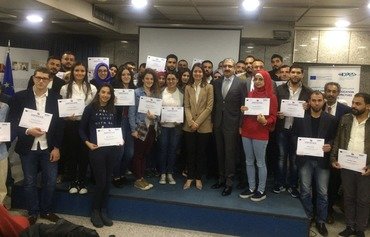A new programme is helping to grant Syrian refugees in Jordan and low-income students from the kingdom access to higher education and vocational training.
The programme, launched March 7th by the EU Regional Trust Fund and overseen by the German Jordanian University, seeks to award academic scholarships to refugees and disadvantaged Jordanians.
The partnership agreement, signed by Andrea Matteo Fontana, who heads the EU delegation in Amman and German Jordanian University president Natheer Abu Obeid, is part of the #NoLostGeneration initiative.
Through the programme, the EU Regional Trust Fund will commit 11 million euros ($11.67 million) to provide 1,000 academic scholarships.
The German Jordanian University is spearheading the programme, which is being implemented through a public-private partnership involving the Jordan University for Science and Technology, Zarqa University and al-Quds College.
This partnership offers vocational education programmes in business management, as well as bachelor's and master's degree programmes in a wide range of disciplines, to about 300 Jordanian and 700 Syrian students.
Realizing youth potential
The programme seeks to help young people realize their potential, economist Hossam Ayesh told Al-Mashareq.
"The lack of education opportunities for a large number of Syrian refugees is a dangerous phenomenon, since these young people will face many problems in the future and an inability to get work opportunities," he said.
Unemployment can in turn lead to social and financial problems, he said.
"We must expand the execution of such programmes for education to reach larger numbers, both refugees and less fortunate Jordanians," he added.
The unemployment rate among Jordanian youth "is 16%, and it is very high among Syrian youth in the kingdom, which requires us to pay more attention to this matter", he said.
Programmes that support higher education for Syrian refugees are significant because many are unable to afford university tuition fees, said Salloum Hamouda, a Syrian refugee and father of five.
"I have a 19-year-old son," he told Al-Mashareq. "He left school four years ago and started working to help me provide for our household's needs."
"My son Qusay lost his chance for academic education because we did not have any hope that I would be able to send him to university, even if he succeeded in public secondary school," he said.
Removing barriers to education
While refugee students have limited access to higher education and vocational training, many have trouble obtaining even the most basic education.
In an April 5th report, Human Rights Watch (HRW) called on donor countries to ensure Syrian refugee children are not deprived of an education.
"Donors and host countries have promised that Syrian children will not become a lost generation, and yet six years into the crisis, that is exactly what is happening," said Bill Van Esveld, senior children’s rights researcher at HRW.
"The governments involved urgently need to fix what is not working, and to do that they need better information on how many children are in school and on how funding is being delivered," he said.
At a February 2016 conference in London, donors and host countries pledged to ensure all Syrian refugee children in the region were enrolled in school in the 2016-2017 school year.
At the time, the UN estimated that 715,000 Syrian refugee children, ages 5 to 17, were not receiving any education in Jordan, Turkey and Lebanon.
The latest UN estimates indicate 536,000 Syrian children are still not in school in these countries.
Donors at the London conference promised to provide annual funding of $933 million for education in host countries, including $250 million for Jordan, and to provide enough of that aid before the beginning of the school year for host countries to plan programmes and put them into operation.
But Jordan reported that, as of September, its funding shortfall was $171 million, and it was still $71 million by the end of December.

![Students stroll through the campus of the German Jordanian University, where a new programme is offering Syrian refugees and disadvantaged Jordanian youth academic scholarships. [Photo from the German Jordanian University's Facebook page]](/cnmi_am/images/2017/04/18/7591-Jordan-university-students-600_384.jpg)






I need to complete my university study at a Jordanian university. I'm a student, but I dropped from classes after I studied computer engineering and information for four years. Only one year was left before graduation, but I couldn't do it. I hope to receive a scholarship to do it. I dropped from classes in 2012, and I haven't resumed my classes ever since.
Reply3 Comment(s)
I'm an economics graduate of the University of Damascus. I hope to receive a scholarship to proceed with my master's degree.
Reply3 Comment(s)
I'm a Syrian student residing in Jordan. I hold a secondary school certificate, sciences section.
Reply3 Comment(s)